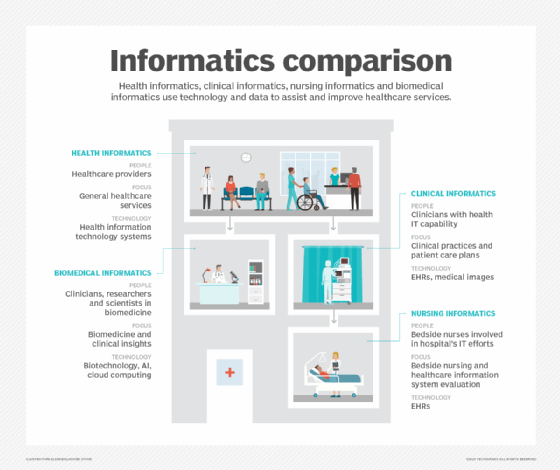biomedical informatics
Biomedical informatics is the branch of health informatics that uses data to help clinicians, researchers and scientists improve human health and provide healthcare. Biomedical informatics is an evolving discipline that has grown along with advances in biomedicine, which applies the principles of the natural sciences, especially biology and biochemistry, to medicine and healthcare. While not solely tied to computers and information technology, biomedical informatics has become more reliant on software, artificial intelligence and cloud computing with the rise of the biotechnology industry and the widespread digitization of personal health data.
Why biomedical informatics is important
Biomedical informatics uses big data and new ways of presenting it, together with traditional scientific research, to reach across medical disciplines to provide clinical insights, uncover disease, treatment and response patterns and point to new lines of scientific and medical inquiry.
Cloud-based supercomputing power has made possible dramatic advances in genomics and DNA sequencing. At the same time, advanced wearable devices are collecting large volumes of physiological data, and sophisticated medical imaging and visualization software and hardware -- such as ultra-high definition displays and 3-D printing -- are providing many more high-quality and relatively inexpensive data sources and ways to view data for clinicians and researchers.
Examples of biomedical informatics
Biomedical informatics can aid a wide range of research and treatment.
For example, a researcher at the University of Pittsburgh's Department of Biomedical Informatics, Roger Day, has studied how computational and biomathematical modeling tools can help provide better biological knowledge that can be applied to individual cancer treatment.
Also, biomedical informaticians in the pharmaceutical drug industry create and manage pharmacovigilance programs to improve the safety of clinical trials and drug testing. Pharmacovigilance software systems use data science and predictive analytics to detect drug trial errors or unknown side effects.
Differences between biomedical informatics, health informatics and clinical informatics
Biomedical informatics focuses on using computational and traditional methods in biology and medicine and on research in genomics, proteomics (the large-scale study of protein), pharmacology and other disciplines that cut across medical disciplines.
Health informatics is broader and more directly related to healthcare treatment approaches. It uses data from specialized healthcare information technologies such as electronic health records and clinical health terminology sets, as well as other sources. It also more directly uses health data exchange standards like HL7 (Health Level 7) and FHIR (Fast Health Interoperability Resources).

Clinical informatics is used in daily patient care by providing physicians, nurses, physical therapists, aides and other clinicians with information that can be used to form a care plan. Clinical informaticians also help caregivers view and use health data from IT systems.





